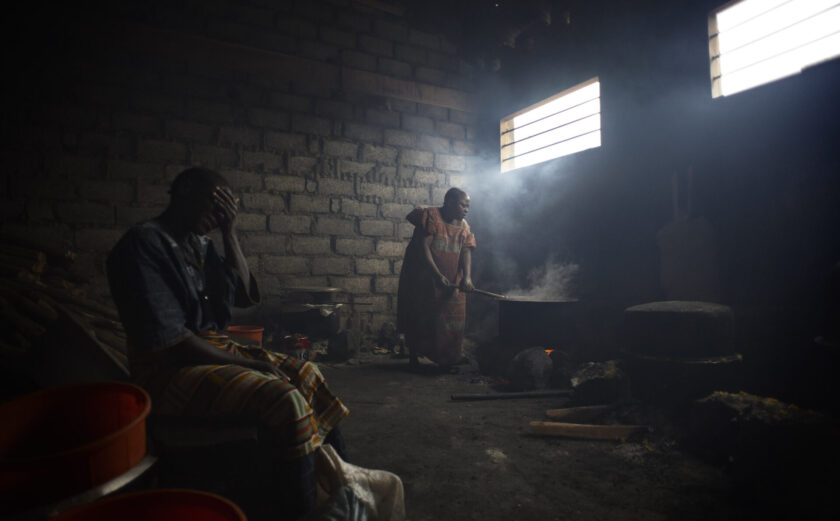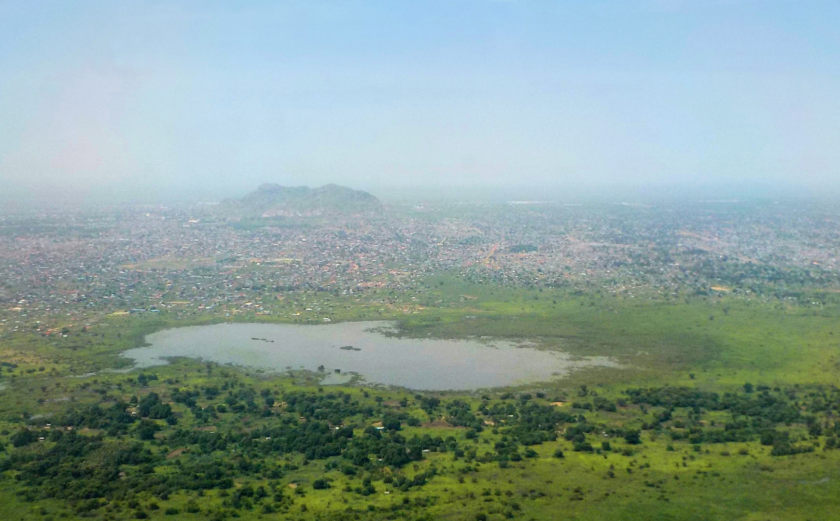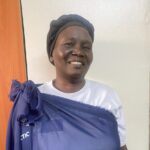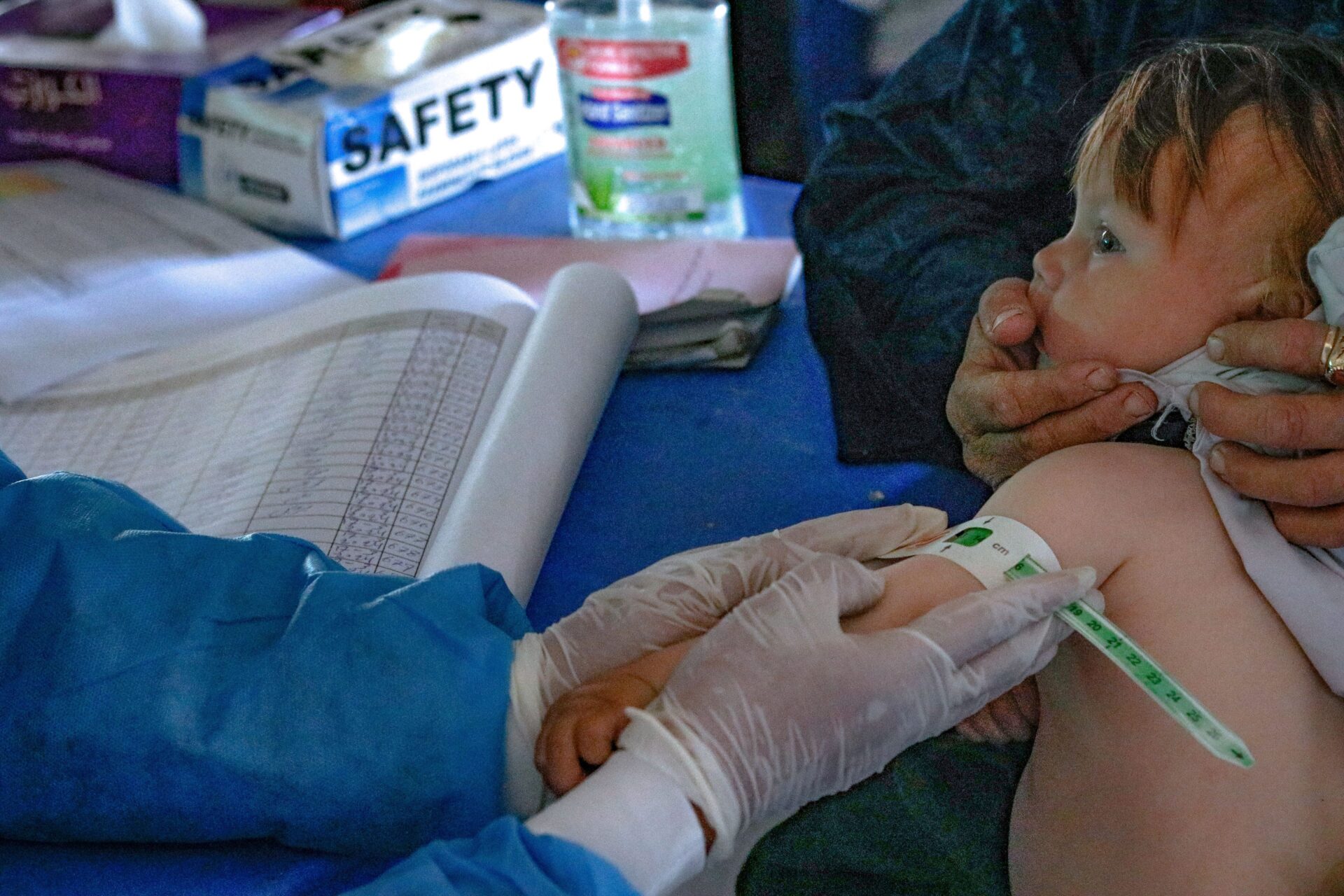
A Lifesaving Response to Malnutrition in Southern Afghanistan
Afghanistan Blog Series
Sara* is a 22-year-old mother who lives in a remote village of southern Afghanistan. She has only one child, a nine-month-old daughter named Shakuria*. Shakuria was suffering from severe acute malnutrition, a condition that affects many children in Afghanistan due to poverty, food insecurity, a lack of health services and awareness, and cultural barriers.
Sara had no hope for her daughter’s survival until she learned about a clinic funded by the U.S. Agency for International Development’s Bureau of Humanitarian Assistance (USAID/BHA) that provides health, nutrition, and mental health and psychosocial support (MHPSS) services near her village. The project, implemented by an InterAction Member, aims to reduce excess morbidity and mortality through providing increased access to lifesaving health, nutrition, and MHPSS services to vulnerable, crisis-affected populations in Afghanistan.
This BHA-funded health and nutrition clinic operates in a rural area of southern Afghanistan, where Sara brought her daughter for treatment. The health and nutrition team examined Shakuria and diagnosed her with severe acute malnutrition, a life-threatening condition that requires urgent intervention. They enrolled Shakuria in the outpatient therapeutic program, where she received ready-to-use therapeutic food, a high-energy peanut-based paste that helps malnourished children recover. They also provided Sara with nutrition counseling and education on infant and young child feeding practices.
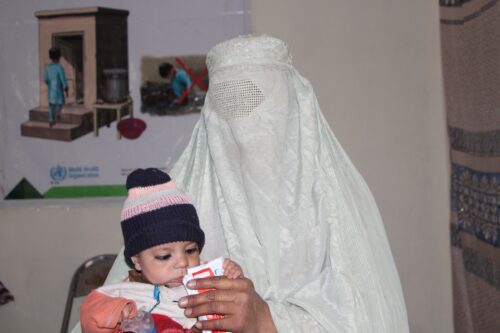
“I am very happy that the very bad health condition of a half-alive child changed, and my child was rescued from death. Now I have many hopes for the life of my beautiful child. Thank you very much for your services,” Sara said.
“We mothers receive useful advice, counselling, and education on baby-caring and safety, and we have learned how to breastfeed the child up to six months and how to take good care of our child and get vaccination doses on time. We have also received psychological support counseling as needed and now our daily life is much better than before,” she added.
Sara’s daughter Shakuria is one of the many children who have been admitted and is benefiting from BHA-funded health and nutrition services in southern and central Afghanistan. From January 2023 to March 2024, the clinics operated by InterAction’s Member admitted 6,532 children under five and pregnant or breastfeeding women for malnutrition treatment. The number of health consultations at the clinics supported by the project for communicable disease for the same period was 95,621.
These health and nutrition clinics offer other essential health services, such as integrated management of childhood and neonatal illness for children under five years, immunization, antenatal care, postnatal care, family planning counselling, first aid and basic trauma care, and treatment of common illnesses. In addition, the clinics provide MHPSS services to address the psychosocial needs of the affected population, such as mental health consultations, counseling, group sessions, and referrals.
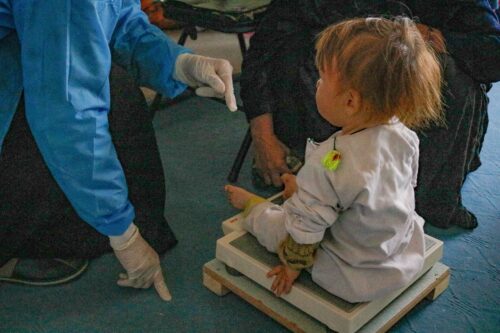
Dr. Noor Ali*, one of the Member’s medical staff who supervises work at these clinics, said: “We are very proud of our work here. We see the positive impact of our services on the lives of the people. We see children recovering from malnutrition, mothers delivering their babies safely, families being protected from diseases. We see hope and resilience in their eyes.
“I value my profession and the service I provide for most vulnerable beneficiaries and patients and malnourished children, and I am very proud of my profession. Treating ill and malnourished children and solving their nutritional problems gives me more positive energy,” he continued.
Dr. Karim Khan*, another medical staff member, noted that “these children are very weak and thin before receiving the services and most of the children are malnourished. After treatment, there are many positive changes in their health and nutrition condition. This is a very big and significant difference. We mostly treat children whose chances of survival are slim.”
The BHA-funded project also involves community mobilization and awareness-raising activities to increase the demand and utilization of health and nutrition services. The project trains and supports community health and nutrition volunteers who conduct home visits, health education sessions, active screening for malnutrition at the household level, referrals, and follow-up.
Zahra*, a female community health and nutrition volunteer who works for the project, says she is “very happy to be part of this project. I feel that I am making a difference in my community. I help mothers and children access the health and nutrition services they need. I also educate them on how to prevent malnutrition and improve their health.”
This BHA-funded project is a lifeline for many people in southern and central Afghanistan who face multiple challenges due to conflict, displacement, poverty, and lack of access to basic services. InterAction Members remain committed to reaching the most vulnerable and marginalized groups with quality health, nutrition, and MHPSS services.
—
* Names have been changed to protect identities.
This blog was written by an InterAction Member that wished to stay anonymous to safeguard their ongoing programs in Afghanistan.


